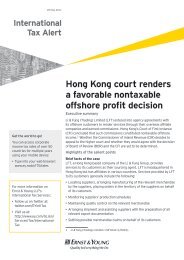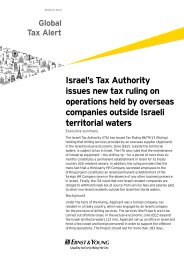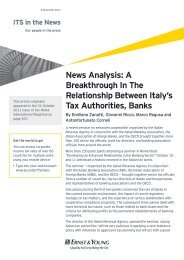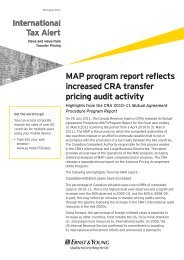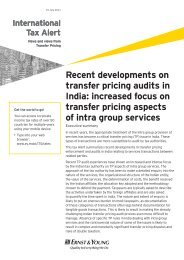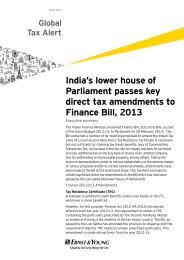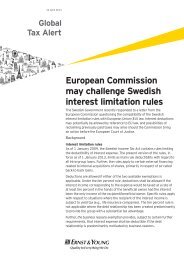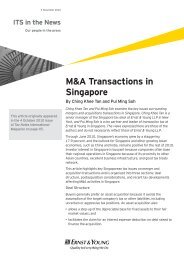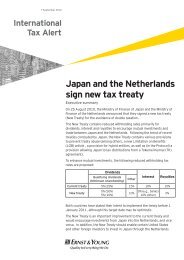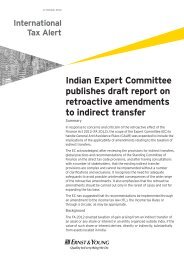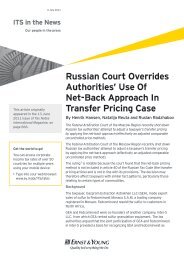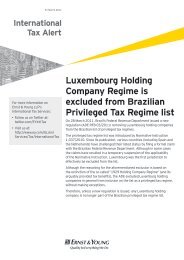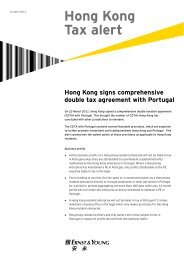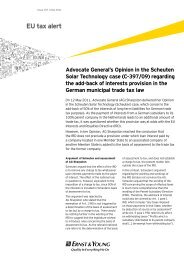Download - Ernst & Young T Magazine
Download - Ernst & Young T Magazine
Download - Ernst & Young T Magazine
Create successful ePaper yourself
Turn your PDF publications into a flip-book with our unique Google optimized e-Paper software.
which the employee is left to fend for themself.<br />
Unsurprisingly, the latter is an option that can<br />
prove tempting in countries where there is little<br />
or no tax to pay, but unpopular elsewhere. A<br />
further approach – known as “net to net” –<br />
adjusts the employee’s net income for the cost of<br />
living in the new country and may be used in<br />
conjunction with one of the other approaches.<br />
As Peter Ferrigno, Leader of <strong>Ernst</strong> & <strong>Young</strong>’s<br />
Human Capital practice for EMEIA, points out,<br />
the aim of equalizing liabilities between<br />
destinations is to remove tax from the question<br />
of whether or nor to accept the assignment.<br />
“Large companies don’t want people to<br />
determine whether they move or not based on<br />
the rate of tax. Tax protection, on the other<br />
hand, to cover the cost of higher rates but giving<br />
someone the benefit of lower ones, becomes<br />
more and more difficult to justify on the grounds<br />
of fairness.”<br />
A global approach<br />
Small wonder therefore that a growing number<br />
of firms, particularly larger multinationals<br />
international, have chosen to set up what are<br />
known as “global employment organizations”<br />
(see box). These seek to lift executives clear of<br />
disagreements over the rate of tax, as well as<br />
problems over entitlements to pensions, by<br />
creating an international entity that hovers over<br />
all destinations.<br />
Often domiciled in an offshore location, such<br />
organizations are popular with oil companies and<br />
firms that need to move skilled people from one<br />
site to another, often at short notice. Instead of<br />
providing a fresh contract each time an employee<br />
moves from one country to another, all those<br />
within the global employment organization are<br />
employed on similar terms.<br />
Such an approach may have its advantages but it<br />
does not suit all, not least because of the cost of<br />
managing offshoots. Take Deutsche Bank, a<br />
global financial services organization<br />
headquartered in Germany that has no fewer<br />
than 180 “country combinations” – sets of<br />
nations, in other words, between which<br />
employees migrate on a mixture of short- and<br />
longer-term contracts. With developing markets<br />
making much of the running within the world<br />
economy, many of the destinations are big cities<br />
in Asia.<br />
“Five years ago,” says Matthew Ozburn,<br />
Deutsche Bank’s Director of Human Resources<br />
International, “the number of executives moving<br />
from job to job around the world was probably<br />
1% of the workforce. Today it may be double<br />
that number, even allowing for a rise in the<br />
number of employees in Germany brought in by<br />
the acquisition of a domestic operation such as<br />
Postbank. “We use an approach which we call<br />
host-based”, says Ozburn. “We start from the<br />
premise that the executive has a pay package<br />
which looks like those of his or her peers. Then,<br />
considerations as to whether or not the employee<br />
has a family, children and so a need for<br />
schooling, etc. are introduced on top.”<br />
“Within each market, we must remain<br />
competitive. So an assignment in, say, Singapore<br />
will be different from one in Frankfurt. We do a<br />
calculation at the outset, which addresses<br />
whether there is an advantage or disadvantage<br />
for the employee. We look at the difference<br />
between what an executive would have received<br />
in their home country and what they stand to<br />
get in the new one. The result is a system of<br />
equalization that allows for the combinations<br />
of pay found in the financial services industry:<br />
a mixture of salary, bonus and deferred<br />
equity.”<br />
Deutsche Bank also uses a system called<br />
“local to local”. Under this, an employee would<br />
complete an assignment on local terms in one<br />
place and then move to another on similar terms.<br />
That such an arrangement is used more and<br />
more reflects, among other things, the growth in<br />
banking in and around offshore and what are<br />
known as near-shore locations. Many such<br />
centers require the same kind of skills,<br />
experience and knowledge, so executives can<br />
move easily from one to another.<br />
Pensions pose a problem<br />
Within the European Union, of course, individuals<br />
assigned from one country to another can<br />
remain under their home state’s system of social<br />
security, subject to certain conditions. This can<br />
be done for up to five years. So, for a typical<br />
assignment, it may not become an obstacle to a<br />
job abroad.<br />
By comparison, says Ferrigno, pensions<br />
remain an issue. In part, he says, this is because<br />
each country’s legislation is different, but also<br />
because of a philosophical difference between<br />
private vs. state, and employer vs. private<br />
provision, in different places. “Long term, the<br />
trend away from final salary systems in countries<br />
like the UK and the US will probably accelerate a<br />
simplification towards schemes based on defined<br />
contributions,” he explains.<br />
Even so, the appetite for mobility among<br />
international executives will still pose difficulties<br />
for companies, not least because of the risk of<br />
getting it wrong. Firms are in danger not just of<br />
leaving employees disgruntled and so losing<br />
them altogether, but also of making mistakes<br />
that can undermine their reputation at home as<br />
well as abroad.<br />
As Debner points out, out that there is a risk<br />
of an employee choosing to do it themselves,<br />
making a mistake and thereby failing to comply,<br />
and so causing trouble for their employer.<br />
“The risk of an investigation by the tax<br />
authorities has increased in recent years.<br />
This can damage a company’s reputation. The<br />
danger of being dragged into the headlines for<br />
alleged wrongdoing is one of the worst.” The<br />
secret, it seems, is to be aware of such risks from<br />
the outset and to manage them as they arise.<br />
Percentage of employees<br />
that are short-term<br />
assignees (



